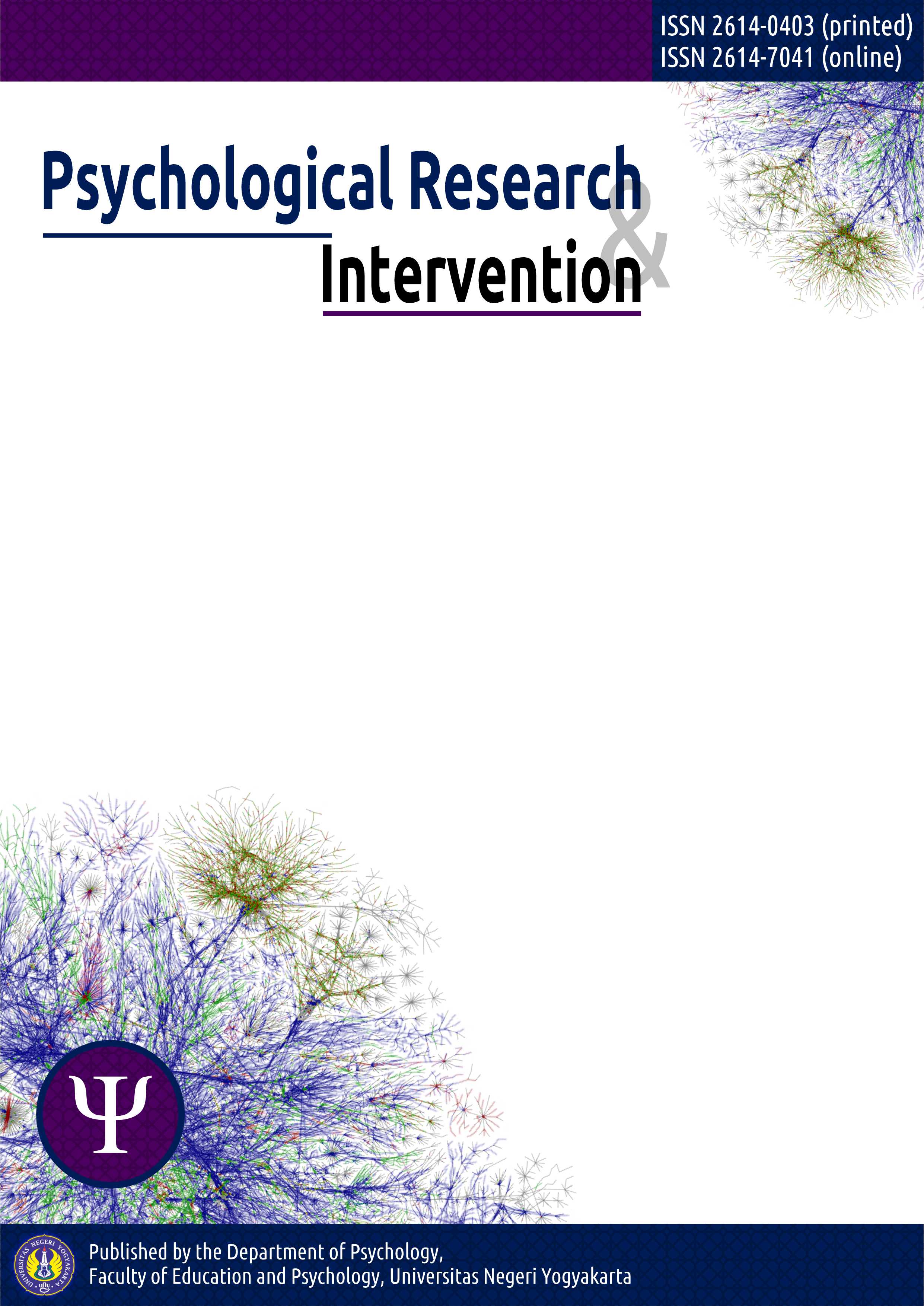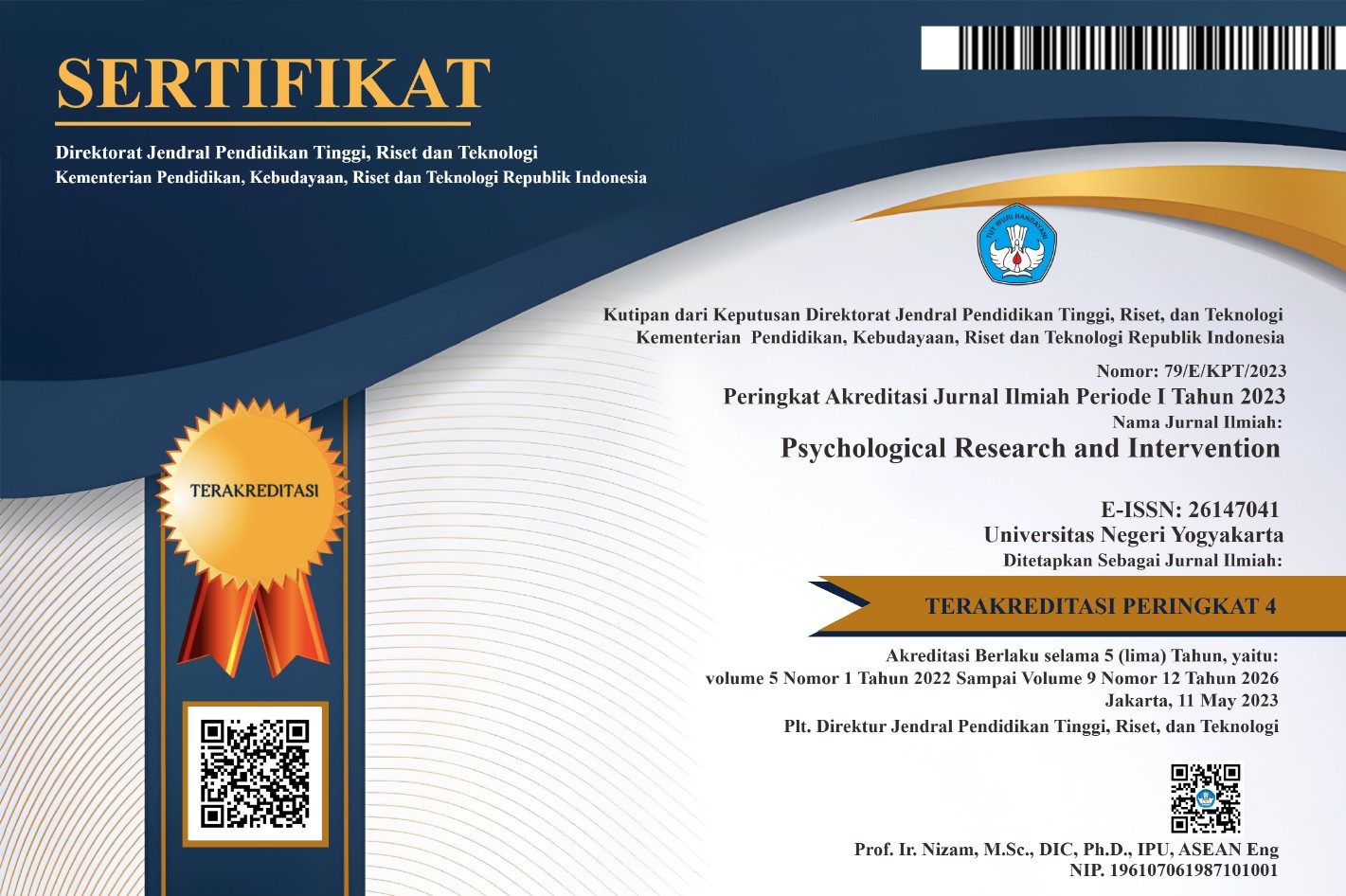The role of academic self-efficacy and school well-being on adjustment of first year university student
DOI:
https://doi.org/10.21831/pri.v6i1.61908Abstract
Adjustment of first year college student is argued as one of the hardest adjustment of a student in their lifetime. This quantitative study examines the contribution of academic self-efficacy toward their adjustment, moderated by their subjective perception of their educational institution's well-being, named as school well-being. Research would be conducted using three scales (adjustment scale, academic self-efficacy scale, and school well-being scale), in a real setting. Participants were 451 students from 9 department of Faculty S, one of faculty from one of the most prestigious university in Yogyakarta, Indonesia. The hypothesis was school well-being and academic self-efficacy would predict the successfulness of first year adjustment. Our findings conclude that school well-being and academic self-efficacy both predicts the score of student's adjustment. Academic self-efficacy contributes 32,29% of first year college student's adjustment, and ScWB contributes another 15,68% of it.
References
Acocella, J., & Calhoun, J. (1990). Psychology of adjustment human relationship (3th ed). New York: McGraw-Hill.
Amanillah, S., & Rosiana, D. (2017). Hubungan School Well-being dengan Motivasi Belajar pada Siswa Kelas XI MA X. Prosiding Psikologi Vol.3 No. 2, 542-547.
Bandura, A. (1997). Self-Efficacy: The Exercise of control. New York: W H Freeman. Bin Hasan, M., Bin Hossain, M., & Islam, M. (2014). Factors Affecting Self- Efficacy Towards Academic Performance: A Study on Polytechnic Students in Malaysia. Advance in Environmental Biology 8 (9), 695-705.
Buehler, C., Fletcher, A., Johnston, C., & Weymouth, B. (2015). Perceptions of School Experiences During the First Semester of Middle School. School Community Journal 25 No 2, 55-83.
Chemers, M., Hu, L.-t., & Garcia, B. (2001). Academic Self-Efficacy and First-Year College Student Performance and Adjustment. Journal of Educational Psychology vol 93, No. 1, 55-64.
Christyanti, D. (2013). Hubungan antra penyesuaia diri terhadap tuntutan akademik dengan kecenderungan stress pada mahasiswa Fakultas Kedokteran Universitas Hang Tuah Surabaya. Jurnal INSAN.
Dami, Z., & Loppies, P. (2018). Efikasi Akademik dan Prokrastinasi Akademik sebagai Prediktor Prestasi Akademik. Kelola: Jurnal Manajemen Pendidikan, vol 5 no.1, 74-85.
Effendi, A., & Siswati. (2016). Hubungan antara School Well-Being dengan Intensi Delinkuensi pada Siswa Kelas XI SMK Negeri Semarang. Jurnal Empati, Vol.5 No.2, 195-199.
Firmanilla, F., & Sawitri, D. (2015). Hubungan antara Efikasi Diri Akademik dengan School Well-Being pada Siswa SMP Hang Tuah 1 Jakarta. Jurnal Empati, Vol 4 (2), 214-218.
Friedlander, L., Reid, G., Shupak, N., & Cribbie, R. (2007). Social Support, Self- Esteem, and Stress as Predictors of Adjustment to University Among First-Year Undergraduates. Journal of College Student Development, 259-274.
Haber, A., & Runyon, R. (1984). Psychology of Adjustment. Homewood, III: Dorsey Press.
Honicke, T., & Broadbent, J. (2016). The Relation of Academic Self-Efficacy to University Student Academic Performance: A Systematic Review. Educational Research Review 17, 63-64.
Hurlock, E. (2004). Psikologi Perkembangan. Jakarta: PT. Gelora Aksara Pratama. Iflah, &
Listyasari, W. (2013). Gambaran Penyesuaian Diri Mahasiswa Baru. Jurnal Penelitian dan Pengukuran Psikologi, 33-36.
Klassen, R. (2004). A Cross-Cultural Investigation of the Efficacy Beliefs of South Asian Immigrant and Anglo Canadian Nonimmigrant Early Adolescents. Journal of Educational Psychology, 731-742.
Konu, A., & Rimpela, M. (2002). Well-being in Schools: A Conceptual Model.
Health Promotion International Vol.17, 79-86.
Konu, A., Alanen, E., Lintonen, T., & Rimpela, M. (2002). Factor Structure of the School Well-Being Model. Health Education Research: Theory & Practice, Vol.17, 732-742.
Luszczynska, A., Scholz, U., & Schwarzer, R. (2005). The General Self-Efficacy Scale: Multicultiral Validation Studies. The Journal of Psychology 139, 439-457.
Maddux, J., & Lewis, J. (1995). Self-efficacy and adjustment: Basic principles and issues. The Plenum series in social/clinical psychology. Self-efficacy, adaptation, and adjustment: Theory, research, and application, 37-68.
Malik, M., Anwar, M., & Ulah, S. (2017). Social Adjustments and Self-Efficacy of University Students. PUTAJ - Humanities and Social Studies Vol.24, No.2, 21-32.
Nailevna, T. (2017). Acculturation and Psychological Adjustment of Foreign Students (the experience of Elabuga Institute of Kazan Federal University). Procedia Social and Behavioral Sciences 237, 1173-1178.
Owen, S., & Froman, R. (1988). Development of a College Academic Self-Efficacy Scale. Proceedings of the Annual Meeting of the National Council on Measurement in Education, New Orleans.
Papalia, D., Olds, S., & Feldman, R. (2009). Human Development. New York: McGraw-Hill.
Puspa Rini, H. (2013). Self Efficacy dengan kecemasan dalam menghadapi ujian nasional. Jurnal Online Psikologi Vol 1 No 1, taken from http://ejournal.umm.ac.id.
Putwain, D., Sander, P., & Larkin, D. (2012). Academic self"efficacy in study" related skills and behaviours: Relations with learning"related emotions and academic success. British Journal of Educational Psychology, 633-650.
Rizki, M., & Listiara, A. (2015). Penyesuaian Diri dan School Well-Being pada Mahasiswa. Seminar Psikologi & Kemanusiaan (pp. 524-529). Malang: Psychology Forum UMM.
Schmidt, A., & DeShon, R. (2010). The Moderating Effects of Performance Ambiguity on the Relationship Between Self-Efficacy and Performance. Journal of Applied Psychology, 572-581.
Schneiders, A. (1964). Personal adjustment and mental health. New York: Holt, Rineheart, & Winston.
Shafira, F. (2015). Hubungan antara Kematangan Emosi dengan Penyesuaian Diri pada Mahasiswa Perantau. Tesis Sarjana, Perpustakaan Fakultas Psikologi Universitas Muhammadiyah Surakarta.
Wijaya, I., & Pratitis, N. (2012). Efikasi Diri Akademik, Dukungan Sosial Orangtua, dan Penyesuaian Diri Mahasiswa dalam Perkuliahan. Jurnal Persona , 40-53.
Willis, K. (2005). Theories and Practices of Development.
Yu, L., Shek, D., & Zhu, X. (2017). The Influence of Personal Well-Being on Learning Achievement in University Students Over Time: Mediating or Moderating Effects of Internal and External University Engagement. Frontiers in Psychology, doi: 10.3389/fpsyg.2017.02287.












